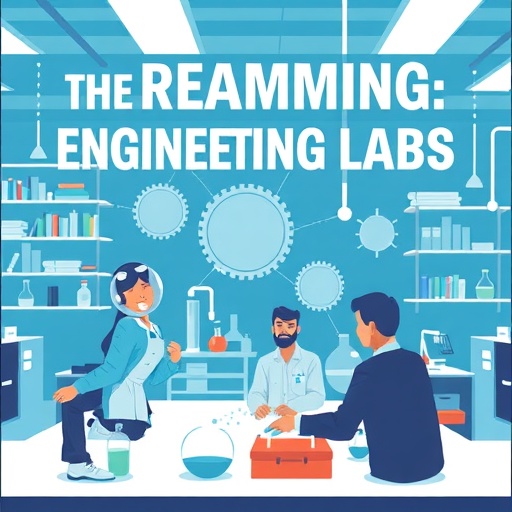
In recent years, the landscape of engineering education has undergone a significant transformation, moving away from traditional lecture-based methods and towards more innovative and engaging approaches. One noteworthy development in this domain is the emergence of inquiry-based laboratory classes, which have been identified as a potent vehicle for enhancing student learning outcomes in engineering disciplines. The recent research article titled “Instructional Design and Implementation of an Inquiry-Based Laboratory Class for Undergraduate Engineering Students” spearheaded by Leo et al. aims to shed light on the effective strategies employed in designing and implementing such instructional methodologies.
At the core of the inquiry-based learning paradigm is the principle that students learn best by engaging in hands-on, experiential learning opportunities. This research highlights that undergraduate engineering students often benefit more from interactive and collaborative environments, where they can actively participate in the learning process rather than passively receiving information. By engaging students in real-world problem-solving scenarios, educators can foster critical thinking, creativity, and a deeper understanding of complex engineering concepts, which are paramount for their future careers.
As education continues to evolve in the context of rapid technological advancements, the challenges faced by students in traditional laboratory settings have also come to the forefront. Many engineering programs have been criticized for their lack of alignment with industry needs, often leaving graduates ill-prepared for the demands of the modern workforce. The authors of the study posit that by integrating inquiry-based methods into laboratory courses, institutions can better equip students with the skills they need to thrive in a competitive job market.
The design and implementation of an inquiry-based laboratory class require careful consideration of several factors, including curriculum development, assessment strategies, and the overall educational environment. Leo and colleagues conducted a comprehensive review of existing literature, which revealed that successful inquiry-based learning experiences are characterized by clear learning outcomes, structured guidance, and opportunities for self-directed exploration. The research presents a framework for educators looking to transition from conventional teaching frameworks to more dynamic inquiry-based approaches.
An integral aspect of this research is the exploration of various instructional strategies that can be employed within the inquiry-based learning model. These strategies encompass cooperative learning, project-based tasks, and the incorporation of technology-enhanced learning tools. By leveraging technology, educators can create immersive learning environments that promote collaboration and engagement among students, ultimately leading to enhanced educational outcomes. The study emphasizes the importance of utilizing digital resources, simulations, and virtual labs to create a comprehensive learning experience that resonates with today’s engineering students.
Moreover, the research highlights the pivotal role of assessment in inquiry-based learning environments. Traditional assessment methods often emphasize rote memorization and standardized testing, which may not accurately reflect a student’s ability to think critically or apply knowledge in real-world situations. The authors recommend that educators develop authentic assessment strategies that evaluate student performance based on their problem-solving processes, teamwork, and adaptability. This shift in assessment practices is crucial for measuring the effectiveness of inquiry-based learning and ensuring that students are adequately prepared for future challenges.
Equally important to the inquiry-based learning process is the role of the instructor. Educators must adapt to this new teaching paradigm by developing their skills and competencies in facilitation and mentorship. The study reveals that successful instructors in inquiry-based settings often serve as guides rather than traditional lecturers, encouraging students to explore, question, and engage deeply with the material. This shift in the educator’s role is essential for fostering a supportive learning atmosphere that promotes student ownership of their educational journey.
Collaboration among students is another vital component of the inquiry-based laboratory experience. The research indicates that when students work together in teams, they are more likely to develop effective communication skills, share diverse perspectives, and learn from one another. This collaborative approach not only enhances the learning experience but also mirrors the teamwork often required in professional engineering contexts. By nurturing these collaborative skills, inquiry-based laboratory classes prepare students for the realities of the workplace, where teamwork and cooperation are key.
Furthermore, the article discusses the significance of aligning inquiry-based laboratory classes with industry standards and expectations. By incorporating real-world challenges and case studies into the curriculum, educators can help students develop practical skills that are directly relevant to their future careers. This alignment not only enriches the learning experience but also improves students’ employability, as they emerge from their programs with a deeper understanding of industry practices and expectations.
Despite the clear benefits of inquiry-based laboratory classes, some challenges remain in their implementation. Institutional resistance, limited resources, and the need for teacher training are obstacles that educators must navigate when transitioning towards this innovative instructional model. The research highlights the importance of institutional support and professional development to ensure that faculty have the tools and knowledge necessary to implement inquiry-based approaches effectively.
The study conducted by Leo et al. serves as an important contribution to the field of engineering education, providing a detailed exploration of the principles, benefits, and challenges of inquiry-based learning environments. The authors advocate for a broader adoption of this instructional model within engineering curricula, arguing that such a transition not only enhances student learning but also cultivates the next generation of engineers equipped with the critical skills needed to face global challenges.
In conclusion, the instructional design and implementation of inquiry-based laboratory classes present a remarkable opportunity for revolutionizing engineering education. By embracing this approach, institutions can foster a more engaging, collaborative, and effective learning environment that prepares students for successful careers. As the demand for skilled engineers continues to rise in today’s complex world, the adoption of innovative educational methodologies becomes ever more pertinent.
In this era of continuous evolution, it is imperative for educators and institutions to collaboratively work towards redefining pedagogical strategies, integrating inquiry-based learning into engineering programs, and ultimately creating a more adaptable workforce ready to tackle pressing global challenges.
Ultimately, the findings of this significant research advocate for a comprehensive rethink of traditional educational approaches in favor of inquiry-based methodologies. By prioritizing real-world application, collaboration, and critical thinking, engineering education can evolve and ensure that its graduates are not just competent technicians but versatile problem-solvers equipped for the future.
The implications of this research resonate beyond engineering, touching upon the very core of educational reform. By fostering environments that value inquiry and exploration, we can cultivate not just engineers but innovators capable of pushing boundaries and redefining our understanding of technology and its role in society.
Subject of Research: The design and implementation of an inquiry-based laboratory class for undergraduate engineering students.
Article Title: Instructional Design and Implementation of an Inquiry-Based Laboratory Class for Undergraduate Engineering Students.
Article References: Leo, C.H., Sockalingam, N., Tan, M.X. et al. Instructional Design and Implementation of an Inquiry-Based Laboratory Class for Undergraduate Engineering Students. Biomed Eng Education (2025). https://doi.org/10.1007/s43683-025-00173-x
Image Credits: AI Generated
DOI:
Keywords: Inquiry-based learning, engineering education, instructional design, collaborative learning, assessment strategies.
Tags: challenges in engineering lab settingscollaborative learning in engineering educationcritical thinking in engineering studentsenhancing student learning outcomesexperiential education strategieshands-on experiential learning in labsinnovative teaching methods in engineeringinquiry-based learning in engineeringinstructional design for engineering labsreal-world problem-solving in educationstudent engagement in laboratory classestransforming traditional engineering education




